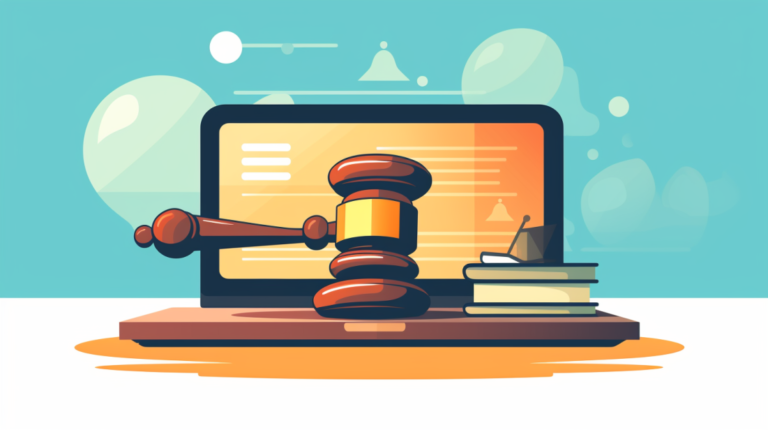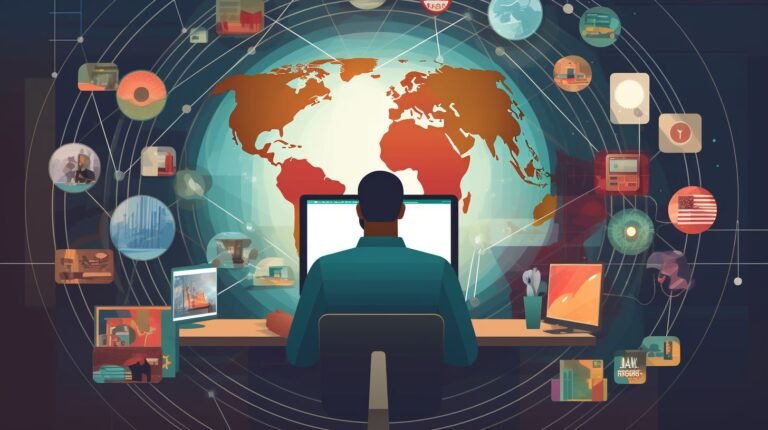Remote Work vs. Freelancing

The landscape of how we hustle is evolving. There are many folks, maybe even including yourself, who find themselves standing at a crossroads – contemplating whether the flexibility of remote work or the autonomy offered by freelancing is right up their alley.
For better or worse, I’ve spent quite some time digging deep into these two tantalizing opportunities to earn your crust with a well-loved local perk—an escape from jarring traffic and punctuality stress.
This trend isn’t new though; in fact, 7 million Americans were already living this lifestyle much before Covid-19 made our humble abodes double as impromptu offices! So come along, let’s decipher these non-conventional career paths together — after all learning never hurts anyone nor does having an extra ace up your sleeve!
Key Takeaways
- Remote work gives you a steady job. You do tasks for one employer and have perks like health plans.
- In remote work, you can still socialize with teammates at virtual meetings.
- Freelance work lets you choose the jobs and who to work for. It could pay more but has its own costs.
- As a freelancer, it is on you to find new projects often and pay your taxes by yourself.
- You must handle all of your workload as a freelancer, there’s no team to share tasks with.
Define Remote Work
Remote work is a flexible style of working where you can perform your job responsibilities from any location, not just an office. It’s a long-term relationship between the employee and employer, offering full-time or part-time employment contracts.
A remote work environment still provides all the benefits of traditional on-site jobs such as healthcare, training allowances, maternity leave and more. As a remote worker, you’re part of an organization’s team and contribute to its overall success while enjoying more control over your schedule and workspace.
Still having colleagues to interact with gives you that sense of belonging in this kind of arrangement even though there might be geographical differences.
Employer-Employee Relationship

In remote work, there is a clear tie between me and the firm that hires me. I am an employee just like on-site workers. The company tells me what projects to do. Also, they decide my pay rate and hours of work.
I follow their rules and use their tools for tasks. They take care of my taxes too because I’m not self-employed in this mode. Plus, if something breaks or goes wrong with the task, it’s on them to fix things.
Provision of Benefits
As a remote worker, I get many perks. My employer gives me health insurance and retirement packages. I also have sick pay and maternity leave if I need them. This makes me feel safe in my job.
Freelance work is different. Here, we only earn money for the work we finish. Freelancers don’t get to enjoy company benefits like remote workers do. So there’s no paid leave or health plans from an employer here! It’s all us in freelance land! We meet our own needs.
Interaction with Colleagues
In remote work, I get to have teammates. We help each other with our tasks and share ideas. If I have a problem, they are there for me. But it is not the same as working in an office.
My co-workers are far from me and we see each other on Zoom only.
Being alone can feel hard at times. Though I may never meet my colleagues face-to-face, networks still grow strong through digital meetings on Google Meets or Zoom apps. Teamwork and learning happen in these virtual spaces too! So even though it can be lonely, there are ways to socialize while working far apart.
Define Freelancing
Freelancing is a form of work where you act as an independent contractor. Instead of having one employer, freelancers operate like mini-companies where they can work for multiple clients.
A major perk can be higher pay due to cutting out the middleman (the company), plus increased autonomy and self-reliance in your workload and schedule. As a freelancer, it’s often on you to find new projects or clients, which adds risk but also more control over your career trajectory than traditional employment roles offer.
Plus, freelancers take care of their own taxes and typically don’t receive benefits such as health insurance or paid leave from those hiring them unless it’s explicitly factored into contract agreements.
Contractor Relationship
Being a freelancer means you are your own boss. You pick the jobs to work on and the clients to work with. This way of working is called a contractor relationship. In this role, no one tells you what to do or how to use your time, because you run your own business.
But it also has risks and hard parts like paying all taxes yourself and finding new jobs often.
Potential for Higher Pay
Freelancing opens the door to more money. You don’t just take a set pay rate. You can talk about your fees for work with clients. If you have a strong skillset, you may get higher pay.
There are no limits to how much money you could earn from your freelance work.
Yet, this does not mean it’s always easy street. Freelancers face their own cost like tax and insurance payments or hiring staff help if needed. They may need funds in down times too when contracts end before new ones begin.
Autonomy and Self-Reliance
Being a freelancer gives you all the power. You get to pick who you work with and what jobs you do. This is great if you like being your own boss! But it also means that everything falls on your shoulders too.
There’s no one else to help out or take some work off your plate when things get tough.
The flip side is, freedom comes with big risks. Your income can change a lot from month to month. And there are no benefits like health insurance or retirement plans unless you set them up yourself.
So, while freelancing gives lots of control and flexibility, it also requires solid skills in managing money and looking after yourself.
Comparing Remote Work and Freelancing

In comparing remote work with freelancing, we delve into the differences in contract length, working location and number of employers or clients each option provides. Is the long-term, single-employer relationship found in remote work more your speed, or does the versatility and independence of working with multiple clients as a freelancer appeal to you more? Let’s explore these factors together to help determine which may suit your lifestyle better.
Read on!
Contract Length
In remote work, the contract length can be a few years. You get steady work and pay with one employer. On the other hand, freelance work has shorter contracts. These contracts may end in weeks or months.
Freelancers take on different jobs when they finish one project since there’s no ongoing promise of more work from a client. With each new task, freelancers must adjust to new terms and rules often.
Working Location
As a remote worker, I can work anywhere. Home and cafes are popular choices. But some companies need their workers to stay close to an office for meetings or team events. So, as a remote employee, the job might not be 100% from home.
Freedom is high in freelance work. As long as there’s Wi-Fi, my laptop becomes my workspace — coffee shops, libraries, parks or overseas trips! No company limits where I can go or when I must show up at an office.
The freedom allows me to enjoy different sights while still completing tasks for clients every day.
Number of Employers or Clients
In my remote work, I stick with one boss. This gives me a steady job but does not offer much change. On the other hand, as a freelancer, I can choose to have many bosses at once. It means more jobs and meeting new people all the time.
But it also needs good workflow management skills. The number of employers or clients differs in both remote work and freelancing!
Pros and Cons of Remote Work and Freelancing
Remote work and freelancing each come with their own set of benefits and drawbacks. Let’s take a look at them in the table below:
| Pros | Cons | |
|---|---|---|
| Remote Work |
|
|
| Freelancing |
|
|
Conclusion

Choosing between remote work and freelancing comes down to personal choice. You might prefer a steady job with benefits. Or you want the freedom of being your own boss. Think about what suits you and your lifestyle best before deciding.
Does Freelancing Have a Positive Impact on Mental Health Like Remote Work?
Freelancing and remote work both have significant impacts on mental health. The flexibility and autonomy of remote work can contribute positively to mental well-being, allowing individuals to manage their time and balance personal and professional commitments. However, the impact of remote work on mental health depends on various factors such as work-life boundaries, social isolation, and self-discipline. Proper support systems and maintaining a healthy work-life balance are crucial to ensuring positive mental health outcomes in both freelancing and remote work.
FAQs
1. What is the main difference between remote work and freelancing?
Remote work means you have a full-time job, but you do it from any location. In freelancing, you run your own business on a project-by-project basis with multiple employers.
2. Which one gives me more freedom – remote work or freelancing?
In terms of location independence and flexible hours, both offer freedom. Freelancing provides complete control over workload management while when working remotely for an employer follows usual office hours.
3. Is there financial risk in being a freelancer?
Yes, financial risks exist in freelancing due to unpredictable income compared to regular paychecks from permanent employment as would be typical with remote jobs provided by local companies.
4. Can I travel while working if I choose either option?
Both allow for flexibility with travel when part of the “work from anywhere” movement often associated with digital nomads who enjoy global mobility during non-traditional work schedules like flextime options or alternative schedule jobs.
5. Do I need to pay my own taxes if I do freelance works?
Yes! As an entrepreneur running your own business, paying self-employment tax along managing other expenses which can sometimes offset against income tax come under your responsibility unlike full time employees where the company handles it.
6. How secure are freelance and remote jobs?
Full-time remote works tend to offer job security much like traditional roles including fixed monthly salary and benefits such as 401(K). However, income in freelancers may surge or drop depending upon repeat businesses availability causing riskier ventures but chances at higher earning potential.






